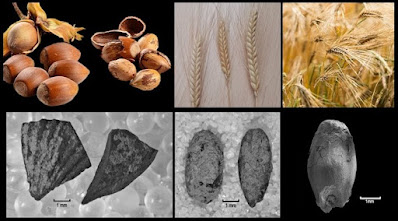The Waterford Archaeological and Historical Society 2022 – 2023 lecture series continues at 8 pm on Friday, April 28th in St Patrick’s Gateway Centre, Waterford (Eircode X91 YX61) when Dr Meriel McClatchie, Associate Professor, School of Archaeology, UCD, will deliver a talk titled ‘Food and Farming in Co. Waterford: Evidence from Archaeological Investigations’.
In this lecture Dr McClatchie will examine food and farming in Co. Waterford over the past 10,000 years, based upon evidence from archaeological excavations. Food remains are often recovered during archaeological excavations, most often in the form of animal bones and plant components such as seeds. The study of this material is known as zooarchaeology and archaeobotany, respectively. The lecture will focus more on archaeobotany, which is Meriel’s main area of research, but zooarchaeology will also be included.
Archaeobotany is the study of past societies and environments through the analysis of preserved plant remains. These tiny, fragile remains require special conditions to enable their preservation over centuries and millennia. Most often they are preserved because they have been burnt, perhaps when being dried or cooked over a fire, or when dumped into a fire as waste. Plant remains can also become preserved when kept consistently wet (waterlogged), which has been encountered in urban deposits from Viking and medieval Waterford. Although animal bones are more durable than plant remains, they also require certain conditions for preservation. Unfortunately, the acidic soils in some parts of Ireland mean that animal bone does not survive well at all sites, but where they are preserved, they can provide important insights into food choices and animal management practices.
Meriel’s talk will take several points in time over the past 10,000 years to explore the character of food and farming in Co. Waterford, and how it changed over the years. The earliest archaeological evidence for settlements in Ireland dates to the Mesolithic period, which began around 10,000 years ago. Over the following four millennia, hunter-gatherers made use of many different environments to gather plants above and below ground, hunt (including wild pig) and fish for food. Farming arrived in Ireland almost 6000 years ago, in the first centuries of the Neolithic period. New domesticated crops and animals were brought to Ireland, including emmer wheat and barley, as well as cattle and sheep/goat. During the Bronze Age, which began over 4000 years ago, and the Iron Age, which began over 2500 years ago, new farming management practices emerged, as well as new crops, such spelt wheat. Following the arrival of Christianity during the early medieval period more than 1500 years ago, farming was transformed, both in terms of how it was practised and what was farmed; new crops included oat and legumes. In some areas, there was a shift towards bread wheat from around 800 years ago (the medieval period), and many records of foods being exported from and imported into Ireland; the latter included ‘exotic’ foods such as figs, almonds and walnuts. Finally, during the post-medieval period (from almost 500 years ago), further changes in food choices can be detected, often reflecting changing social and religious practices. This lecture will draw upon case studies from each period over the past 10,000 years to explore changing food practices and what these can reveal about broader society.
Meriel McClatchie is an Associate Professor of Archaeology at University College Dublin. She began her studies at University College Cork, where she completed BA and MA degrees in 1995 and 1997, respectively. She later undertook PhD research at University College London (degree awarded 2009). Since her undergraduate studies, Meriel’s main research interest has been what is known as ‘archaeobotany’: the scientific analysis of ancient non-wood plant macro-remains, such as cereal grains and chaff, seeds of other crops, weed seeds, fruit stones and nutshell. Archaeobotany was the basis of both her Masters dissertation at UCC (which explored medieval engagements with plants) and PhD thesis at UCL (which explored food and farming in Bronze Age Ireland). Her current research is focused on archaeology in Europe, with a particular interest in food (from early prehistoric to early modern societies), prehistoric landscapes and settlements. In recent years, she has undertaken fieldwork in Serbia and Tanzania, and she also undertook fieldwork in Uganda during her PhD studies.
Meriel is Director of the Ancient Foods Research Group and the Archaeobotany Laboratory at UCD. Her current major research projects are investigating
• early modern foodways (Foodcult; www.foodcult.eu)
• underutilised crops (Croprevive; https://www.ucd.ie/archaeology/research/croprevive/) and
• food storage and security (Foodsec; https://www.ucd.ie/archaeology/research/foodsec/).
All welcome, non-members €5.


